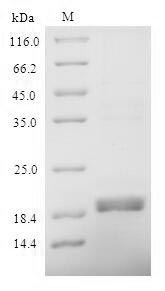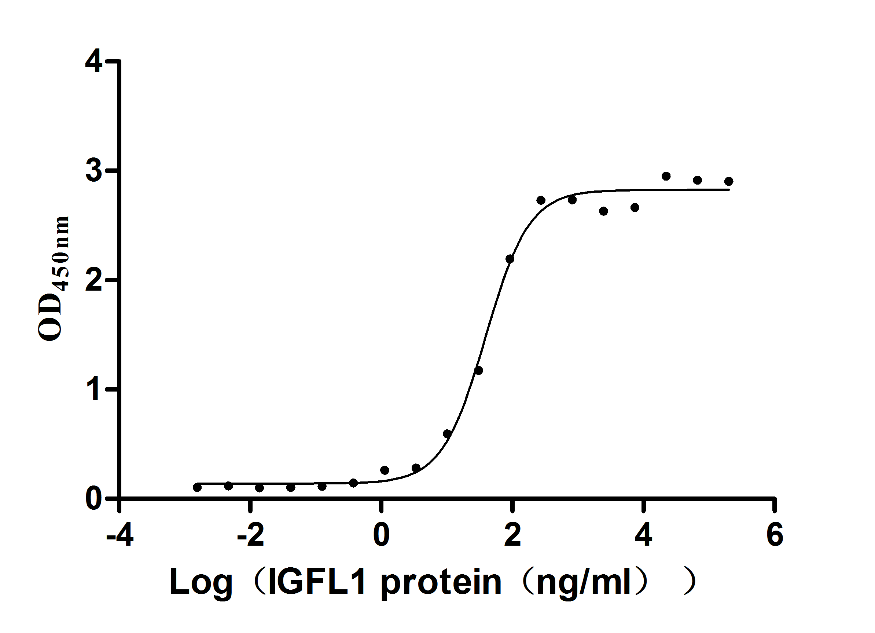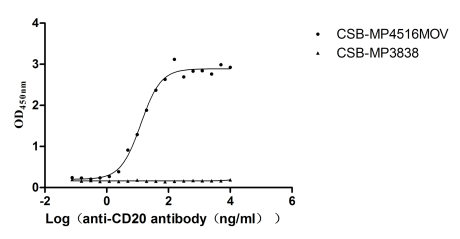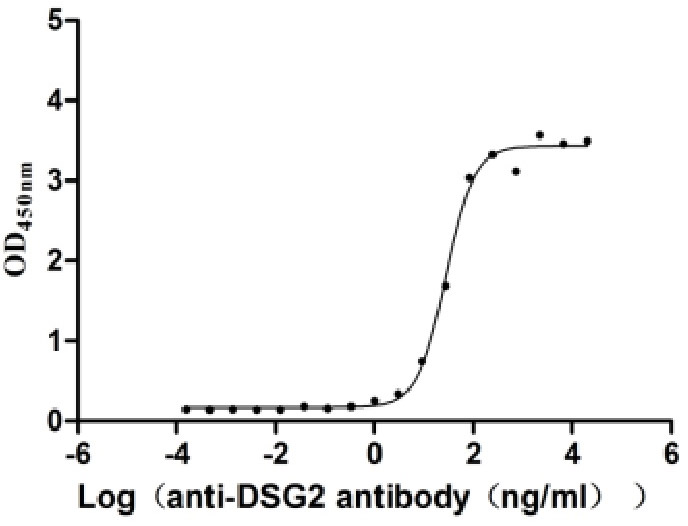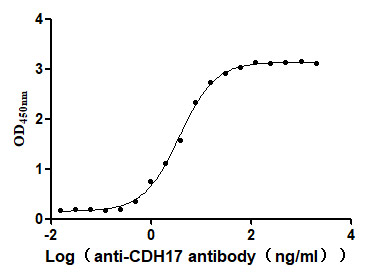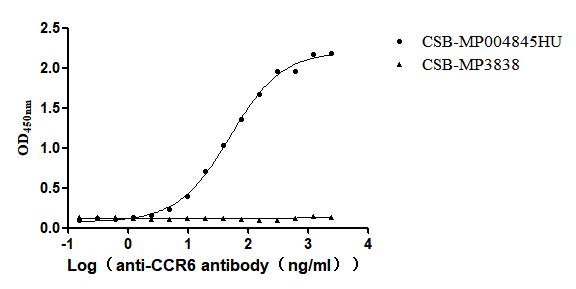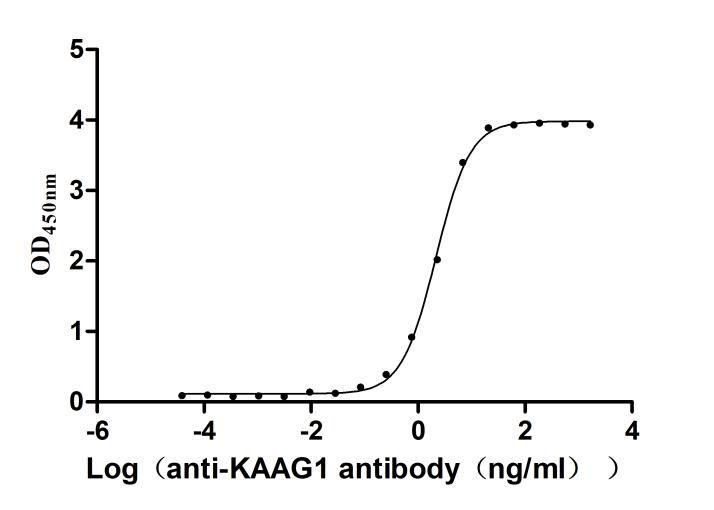Recombinant Mouse Regenerating islet-derived protein 3-gamma (Reg3g), partial
Unavailable-
货号:CSB-EP019549MO
-
规格:¥1836
-
图片:
-
其他:
产品详情
-
纯度:Greater than 90% as determined by SDS-PAGE.
-
基因名:Reg3g
-
Uniprot No.:
-
别名:Reg3g; Pap3; Regenerating islet-derived protein 3-gamma; REG-3-gamma; Pancreatitis-associated protein 3; Regenerating islet-derived protein III-gamma; Reg III-gamma) [Cleaved into: Regenerating islet-derived protein 3-gamma 16.5 kDa form; Regenerating islet-derived protein 3-gamma 15 kDa form]
-
种属:Mus musculus (Mouse)
-
蛋白长度:Partial
-
来源:E.coli
-
分子量:20.3kDa
-
表达区域:27-174aa
-
氨基酸序列EVAKKDAPSSRSSCPKGSRAYGSYCYALFSVSKNWYDADMACQKRPSGHLVSVLSGAEASFLSSMIKSSGNSGQYVWIGLHDPTLGYEPNRGGWEWSNADVMNYINWETNPSSSSGNHCGTLSRASGFLKWRENYCNLELPYVCKFKA
Note: The complete sequence including tag sequence, target protein sequence and linker sequence could be provided upon request. -
蛋白标签:N-terminal 6xHis-tagged
-
产品提供形式:Liquid or Lyophilized powder
Note: We will preferentially ship the format that we have in stock, however, if you have any special requirement for the format, please remark your requirement when placing the order, we will prepare according to your demand. -
缓冲液:Tris-based buffer,50% glycerol
-
储存条件:Store at -20°C/-80°C upon receipt, aliquoting is necessary for mutiple use. Avoid repeated freeze-thaw cycles.
-
保质期:The shelf life is related to many factors, storage state, buffer ingredients, storage temperature and the stability of the protein itself.
Generally, the shelf life of liquid form is 6 months at -20°C/-80°C. The shelf life of lyophilized form is 12 months at -20°C/-80°C. -
货期:Basically, we can dispatch the products out in 1-3 working days after receiving your orders. Delivery time may differ from different purchasing way or location, please kindly consult your local distributors for specific delivery time.Note: All of our proteins are default shipped with normal blue ice packs, if you request to ship with dry ice, please communicate with us in advance and extra fees will be charged.
-
注意事项:Repeated freezing and thawing is not recommended. Store working aliquots at 4°C for up to one week.
-
Datasheet & COA:Please contact us to get it.
相关产品
靶点详情
-
功能:Bactericidal C-type lectin which acts exclusively against Gram-positive bacteria and mediates bacterial killing by binding to surface-exposed carbohydrate moieties of peptidoglycan. Restricts bacterial colonization of the intestinal epithelial surface and consequently limits activation of adaptive immune responses by the microbiota. The uncleaved form has bacteriostatic activity, whereas the cleaved form has bactericidal activity against L.monocytogenes and methicillin-resistant S.aureus. Regulates keratinocyte proliferation and differentiation after skin injury.
-
基因功能参考文献:
- the secretion of regenerating islet-derived IIIgamma (RegIIIgamma) is responsible for the protective effect of Adipose-derived stem cells. PMID: 26866937
- The study shows that cardiac stress activates Reg3gamma expression and p38 MAPK is an upstream regulator of Reg3gamma gene expression in heart. Altogether the data suggest Reg3gamma is associated with cardiac inflammatory signaling. PMID: 27798352
- regenerating islet-derived gene gamma promotes beta cell regeneration and preserves beta cells from autoimmunity damage by increasing regulatory T cell differentiation and inducing tolerated dendritic cells. PMID: 26667474
- Recombinant IFN-I or IFN-I expression induced by RIG-I promoted growth of intestinal organoids in vitro and production of the antimicrobial peptide regenerating islet-derived protein 3 gamma (RegIIIgamma). PMID: 28424327
- REG3gamma-deficient mice have altered mucus distribution and increased mucosal inflammatory responses to the microbiota and enteric pathogens in the ileum. PMID: 24345802
- antibacterial function for lung epithelium through Stat3-mediated induction of Reg3gamma. PMID: 23401489
- Reg-IIIgamma expression is mainly observed in epithelial cells of the airways and intestine, but not in the nervous system; expression levels show a gradually increasing pattern along with development. PMID: 21681751
- Letter: aggregation status of PAP1 and PAP2 could change their role in regulating the inflammation in acute pancreatitis. PMID: 21926556
- findings show that RegIIIgamma is essential for maintaining a ~50-micrometer zone that physically separates the microbiota from the small intestinal epithelial surface PMID: 21998396
- findings show that RegIIIgamma and its human counterpart, HIP/PAP, are directly antimicrobial proteins that bind their bacterial targets via interactions with peptidoglycan carbohydrate PMID: 16931762
- antibacterial activities of mouse RegIIIgamma and its human ortholog, HIP/PAP, are tightly controlled by an inhibitory N-terminal prosegment that is removed by trypsin in vivo. PMID: 19095652
显示更多
收起更多
-
亚细胞定位:Secreted. Cytoplasm.
-
组织特异性:Predominantly expressed in the small intestine, including Paneth cells (at protein level). Hardly detectable in the colon (at protein level). Highly expressed in the lung epithelium during methicillin-resistant S.aureus infection (at protein level). Skin
-
数据库链接:
KEGG: mmu:19695
STRING: 10090.ENSMUSP00000032089
UniGene: Mm.252385
Most popular with customers
-
Recombinant Human IGF-like family receptor 1 (IGFLR1), partial (Active)
Express system: Mammalian cell
Species: Homo sapiens (Human)
-
Recombinant Macaca fascicularis Membrane spanning 4-domains A1 (MS4A1)-VLPs (Active)
Express system: Mammalian cell
Species: Macaca fascicularis (Crab-eating macaque) (Cynomolgus monkey)
-
Recombinant Human Desmoglein-2 (DSG2), partial (Active)
Express system: Mammalian cell
Species: Homo sapiens (Human)
-
Recombinant Human Cadherin-17 (CDH17), partial (Active)
Express system: Mammalian cell
Species: Homo sapiens (Human)
-
Recombinant Human C-C chemokine receptor type 6(CCR6)-VLPs (Active)
Express system: Mammalian cell
Species: Homo sapiens (Human)
-
Recombinant Human Dipeptidase 3(DPEP3), partial (Active)
Express system: Mammalian cell
Species: Homo sapiens (Human)
-
Recombinant Human Kidney-associated antigen 1(KAAG1) (Active)
Express system: E.coli
Species: Homo sapiens (Human)

